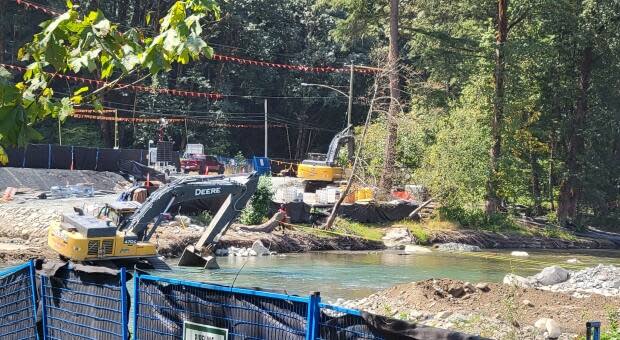Trans Mountain says pipeline work in Coquihalla River complete as salmon concerns mount

Days after criticism that construction on the Trans Mountain expansion project in the Coquihalla River near Hope B.C., may be affecting spawning sockeye salmon populations, the company behind the project says the pipeline work is complete.
"Now that the pipe has been installed, the stream will return to the natural flow path and any early-run salmon will be able to continue to move upstream through the river system," the company said in a statement. "Work to reclaim the site to its original condition with additional bed and bank flood protection is ongoing."
Earlier this month, Trans Mountain (TMX) began damming and digging up the river bed to install a new pipeline under it as part of the expansion of the nearly 70-year-old pipeline, which runs from Alberta to British Columbia's coast.
The work near Hope also included replacing a segment of existing pipeline beneath the river.
Local residents, academics and First Nations are asking the Department of Fisheries and Oceans to pause the work over concern that TMX's activities are blocking salmon from navigating the river to spawn.
The Coquihalla River is a tributary of the Fraser River. The advocates said they found dead salmon, some full of eggs, in and around the worksite. They also posted drone footage of salmon seemingly cut off from navigating upstream.

'Grave alarm'
B.C. Environment Minister George Heyman said the province was investigating the work within its jurisdiction.
On Thursday, four NDP MPs from B.C. sent a letter to four federal ministers, including Fisheries Minister Joyce Murray and Natural Resources Minister Jonathan Wilkinson, both B.C. politicians, saying the work was harming the province's salmon populations.
The letter also asked the federal government to intervene and halt construction until salmon have safely spawned.
The letter argues that the company is contravening DFO permits because construction is taking place despite spawning salmon arriving early in the river.
"The DFO permit lays out numerous conditions to which TMX must adhere to avoid and mitigate impacts to fish and fish habitat," reads the letter. "The reports and observations of dead fish by local residents, in this context, are cause for grave alarm."

The company said its work was in compliance with environmental protection plans and permits issued by DFO, the B.C. Oil and Gas Commission and the provincial Forests Ministry for moving any trapped fish upstream to safety.
'Likely pre-spawn mortality'
DFO said in a statement on Friday that its staff members, along with Indigenous advisers and monitors, have visited the site several times since Monday but did not announce any requirement for the company to halt or change its work.
DFO says it expects Trans Mountain to complete restoration work at the site by Aug. 19, "which is before Coquihalla salmon populations return to spawn," the spokesperson said in an email to CBC News.
The agency said that dead fish reported by others at the site "is likely pre-spawn mortality" from the fish expending too much energy waiting in the Coquihalla River for high water levels in the Fraser River to subside.
It says it will continue to monitor work at the site for regulatory compliance and "to ensure fish and fish habitat are protected."
At the site on Friday, Tim Takaro, an SFU professor emeritus in environmental health, who is well known for his anti-pipeline protesting, said there was still significant work affecting salmon being done by excavators in the river.
"Anyone can see that they are damaging a salmon run here outside of Hope," he said. "I would like to see them stop disturbing fish habitat."
He and other activists are not confident that DFO, a ministry of the government which purchased the pipeline project in 2018, is properly inspecting the site or Trans Mountain's activities there.
"I would like to see them enforce the spirit of the regulation, which is to protect the salmon."

 Yahoo Movies
Yahoo Movies 